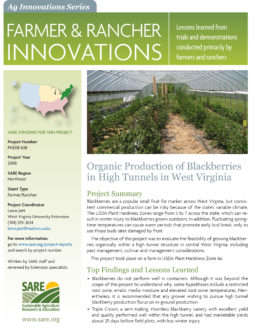Blackberries are a popular small fruit for market across West Virginia, but consistent commercial production can be risky because of the state’s variable climate. The USDA Plant Hardiness Zones range from 5 to 7 across the state, which can result in winter injury to blackberries grown outdoors. In addition, fluctuating springtime temperatures can cause warm periods that promote early bud break, only to see those buds later damaged by frost.
The objective of this project was to evaluate the feasibility of growing blackberries organically within a high tunnel structure in central West Virginia, including pest management, cultivar and management considerations.
This project took place on a farm in USDA Plant Hardiness Zone 6a.
About this series: Farmer and Rancher Innovations, part of the Ag Innovations series, capture the lessons learned from SARE-funded trials and demonstrations conducted primarily by farmers and ranchers.
Want more information? See the related SARE grant:
This material is based upon work that is supported by the National Institute of Food and Agriculture, U.S. Department of Agriculture through the Sustainable Agriculture Research and Education (SARE) program. Any opinions, findings, conclusions, or recommendations expressed in this publication are those of the author(s) and should not be construed to represent any official USDA or U.S. Government determination or policy.
